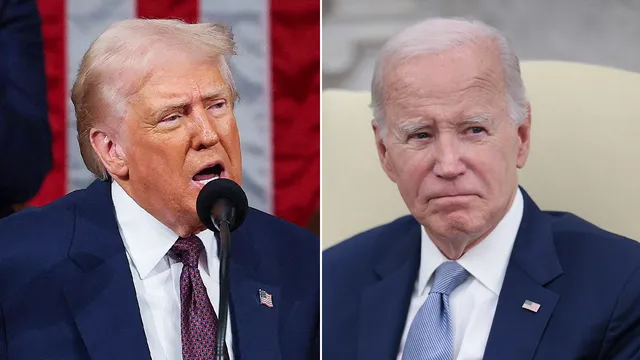
Trump claims Biden's pardons are void and threatens January 6 investigators
2025-03-19 07:00- President Trump declared Biden's pardons void, claiming illegitimacy due to an autopen being used.
- He asserted that Biden was unaware of the pardons and that those involved may have committed crimes.
- This situation intensifies investigations concerning the January 6 committee members previously pardoned.
Express your sentiment!
Insights
In the United States, President Donald Trump made a controversial declaration regarding the pardons issued by his predecessor, Joe Biden. He labeled these pardons as 'void, vacant, and of no further force or effect' claiming that Biden signed them using an autopen rather than his actual signature. This assertion raised questions about the validity of the pardons, which had included those for several individuals, including former members of the Select Committee investigating the January 6 Capitol riot. Trump's remarks instigated a potential political fallout, suggesting that those involved in issuing the pardons may have committed crimes due to the alleged lack of Biden's knowledge and consent. Trump took to Truth Social, where he stated that Biden was unaware of the pardons at the time they were issued. He specifically accused Biden of not having any involvement in the decision-making process surrounding the pardons and asserted that the documents were not properly approved. This declaration has instigated discussions in various political circles, prompting concerns regarding the implications it holds for the members of the January 6 committee that had been conducting investigations related to the Capitol riot that occurred in January 2021. The president's remarks further escalated conflicts by implying that the members of this committee, referred to as the 'Unselect Committee' by Trump, may now be open to investigations themselves. He expressed that the individuals responsible for overseeing the pardons were potentially subject to serious legal repercussions for their actions. This new development has certainly heightened tensions in an already polarized political landscape, showcasing Trump's ongoing refusal to accept the findings of the January 6 investigations and his attempts at countering any accountability measures against him and his affiliates. In addition to the ongoing tensions framed by these pardons, Trump’s focus on the investigation also reflects a broader strategy of redirecting attention away from his own administration's controversies, by positioning himself against the committee that he believes has unjustly targeted him. This declaration may result in complicated legal battles as members of the committee could face pressures from both sides of the political spectrum amid calls for accountability. As this situation continues to unfold, it remains to be seen how Biden’s administration and the justice system will respond to the claims made by Trump, especially as they pertain to the pardons issued in Biden’s final days in office.
Contexts
The legal implications of voided presidential pardons can be complex and multifaceted, touching upon constitutional law, the separation of powers, and the rights of individuals affected by such pardons. A presidential pardon, as outlined in Article II, Section 2 of the U.S. Constitution, grants the president the authority to forgive individuals for federal offenses. However, instances of voiding a presidential pardon raise critical questions about the limits of this power and the potential for abuse of discretion. The circumstances under which a pardon may be revoked or declared void can result from various factors, such as a lack of adherence to constitutional protocols or subsequent criminal activity by the individual that undermines the integrity of the initial pardon. In essence, voided pardons can erode public trust in the executive branch and set precedents that define the boundaries of presidential power. Legal scholars have debated the question of whether a presidential pardon can be revoked once it has been granted. Some argue that the nature of a pardon is absolute and that the president's decision should be final, while others cite that the rule of law must prevail, especially if the pardoned individual engages in behavior that warrants further legal scrutiny. The potential for legal challenges emerges when individuals affected by voided pardons seek recourse through the judicial system. Courts may be called upon to interpret the Constitution concerning executive powers and to balance the interests of justice against the rights of individuals who have relied on the pardon's validity. Additionally, the political ramifications of voided pardons can lead to contentious debates within Congress and among the electorate, causing shifts in public opinion regarding the overall authority of the presidency. The consequences for individuals whose pardons are later voided can be dire. Individuals may find themselves retried for crimes they believed were behind them, often leading to significant emotional and financial distress. Such situations may also carry broader societal implications, particularly in debates about rehabilitation and restorative justice. Understanding how voided pardons impact those individuals and their families is essential in crafting policies and legislative measures regarding clemency practices. The legal landscape surrounding these pardons showcases the need for clear guidelines and transparency in the pardoning process to safeguard the rights of all stakeholders involved. In conclusion, the legal implications of voided presidential pardons extend well beyond the individuals directly involved. They involve crucial discussions about executive power, the rule of law, and the balance of justice in society. As these legal battles unfold, they will continue to reverberate through the judicial system and shape the political discourse, ultimately influencing future interpretations of presidential authority. A thorough examination of the legal principles involved will be vital in ensuring that the integrity of the pardoning process is preserved and that the rights of individuals are adequately protected, thereby reinforcing the public's faith in the justice system as a whole.